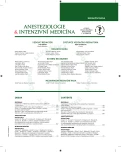Vasopressin and its role in anaesthesiology and intensive care medicine
Authors:
M. Balík 1; V. Černý 2; V. Šrámek 3; M. Matějovič 4; J. Kunstýř 1
Authors‘ workplace:
KARIM 1. LF UK a VFN, Praha
1; KARIM Masarykova nemocnice, Ústí nad Labem
2; KAR FN U sv. Anny, Brno
3; 1. interní klinika FN PLzeň
4
Published in:
Anest. intenziv. Med., 26, 2015, č. 4, s. 223-227
Category:
Special article
Overview
Vasopressin has an essential role in the regulation of the vasomotor tone. Its insufficient level plays a substantial role in the pathophysiology of refractory shock associated with sepsis, haemorrhage and extracorporeal circulation. Its role in the control of arterial pressure is emphasised at times when other systems are blocked, not functional, or incapable of maintaining blood pressure – for example in septic shock or in refractory vasoparalysis. A low dose of vasopressin may contribute to normalisation of the vascular tone and perfusion of vital organs.
The indications for vasopressin administration include septic shock with a need for high-dose noradrenaline infu-sion, particularly in patients with myocardial dysfunction and pulmonary hypertension. Vasopressin is indicated not only in vasoparalysis related to sepsis but also due to antihypertensive drug poisoning and in cardiac anaesthesia. Its role is recognized in brain-dead organ donors, portal hypertension and during cardiopulmonary resuscitation.
In contrast to many EU countries, Canada, Australia and New Zealand, the availability of vasopressin in the Czech Republic depends on special delivery which makes it a scarce drug for a critically ill patient who needs the drug urgently. The only available option is its synthetic analogue terlipressin which possesses different pharmacodynamics with a long halftime, and its infusion is rather difficult to operate with a significantly higher number of side effects. Therefore, the registration of vasopressin on the Czech market would be very desirable.
Keywords:
vasopressin – septic shock – hypotension – vasoparalysis – portal hypertension – organ donors – cardiopulmonary resuscitation
Sources
1. Russel, J. A. Bench-to-bedside review: Vasopressin in the mana-gement of septic shock. Crit. Care, 2011, 15, p. R226.
2. Landry, D. W., Oliver, J. A. The Pathogenesis of Vasodilatory Shock. N. Engl. J. Med., 2001, 345, 8, p. 588–595.
3. Leone, M., Martin, C. Vasopressor use in septic shock: an update. Curr. Opin. Anesth., 2008, 21, p. 141–147.
4. Russel, J. A., Walley, K. R., Singer, J., Gordon, A. C., Hé-bert, P. C., Cooper, D. J. et al. Vasopressin versus Norepinephrine Infusion in Patients with Septic Shock. NEJM, 2008, 358, 9, p. 877–887.
5. Landoni, G., Bove, T., Szekely, A., Comis, M. et al. Reducing mortality in acute kidney injury patients: systematic review and international web-based survey. J. Cardiothorac. Vasc. Anesth., 2013, 27, 6, p. 1384–1398.
6. Gordon, A. C., Russell, J. A., Walley, K. R., Singer, J., Ayers, D., Storms, M. M. et al. The effects of vasopressin on acute kidney injury in septic shock. Intensive Care Med., 2010, 36, p. 83–91.
7. De Backer, D., Scolletta Vasopressors in shock: too early to move away from catecholamines? Br. J. Pharmacol., 2012, 165, p. 2012–2014.
8. Jung-Joon, Cha, Chung, H., Won Yoon, Y. et al. Diverse geometric changes related to dynamic left ventricular outflow tract obstruction without overt hypertrophic cardiomyopathy. Cardiovascular Ultrasound, 2014, 12, p. 23.
9. Anger, K. E., Szumia, P. M., Reardon, D. P., DeGrado, J. R. Early vasopressin reduces incidence of new onset arrhythmias. J. Crit. Care, 2014, 29, 4, p. 482–485.
10. Levy, M. M., Rhodes, A., Annane, D. et al. Surviving Sepsis Campaign: international guidelines for management of severe sepsis and septic shock, 2012. Intensive Care Med., 2013, 39, 2, p. 165–228.
11. Serpa-Neto, A., Nassar, A. P. Jr., Cardoso, S. O. et al. Vasopressin and terlipressin in adult vasodilatory shock: a systematic review and meta-analysis of nine randomized controlled trials. Crit Care, 2012, 16, R154.
12. Kunstyr, J., Lincova, D., Mourad, M., Lips, M., Cermak, T., Kotulak, T., Blaha, J., Rubes, D., Matias, M., Stritesky, M. A retrospective analysis of Terlipressin infusion in patients with refractory hypotension after cardiac surgery. J. Cardiovasc. Surg.,2008, 49, 3, p. 381–387.
13. Solanki, P., Chawla, A., Garg, R., Gupta, R., Jain, M., Sa-rin, S. K. Beneficial effects of terlipressin in hepatorenal syndrome: A prospective, randomized placebo-controlled clinical trial.J. Journal of Gastroenterology and Hepatology, 2003, 18, p. 152–156.
14. Antonio Paulo Nassar, Jr., Queiroz Farias, A., Augusto Carneiro d’ Albuquerque, L., Jose´ Carrilho, F., Marcelo Sa´ Malbouisson, L. Terlipressin versus Norepinephrine in the Treatment of Hepatorenal Syndrome: A Systematic Review and Meta-Analysis. Plos One, 2014, 9, 9, e107466.
15. Plurad, D. S., Neville, A., Bongard, F., Putnam, B. Arginine vasopressin significantly increases the rate of successful organ procurement in potential donors. Am. J. Surg., 2012, 204, 6, p. 856–860.
16. Aung, K., Htay, T. Vasopressin for cardiac arrest: a systematic review and metaanalysis. Arch. Intern. Med., 2005, 165, p. 17–24.
Labels
Anaesthesiology, Resuscitation and Inten Intensive Care MedicineArticle was published in
Anaesthesiology and Intensive Care Medicine

2015 Issue 4
-
All articles in this issue
- Vasopressin and its role in anaesthesiology and intensive care medicine
- Echocardiography for cardiac output assessment in critically ill patients
- Peri-operative management of the obese surgical patient 2015
- Use of interactive education in undergraduate teaching of acute medicine: the virtual and standardised patient, operating theatre broadcasting
- Results of ECMO therapy in cohorts of neonates and children
- Anaesthesiology and Intensive Care Medicine
- Journal archive
- Current issue
- About the journal
Most read in this issue
- Vasopressin and its role in anaesthesiology and intensive care medicine
- Echocardiography for cardiac output assessment in critically ill patients
- Peri-operative management of the obese surgical patient 2015
- Results of ECMO therapy in cohorts of neonates and children
